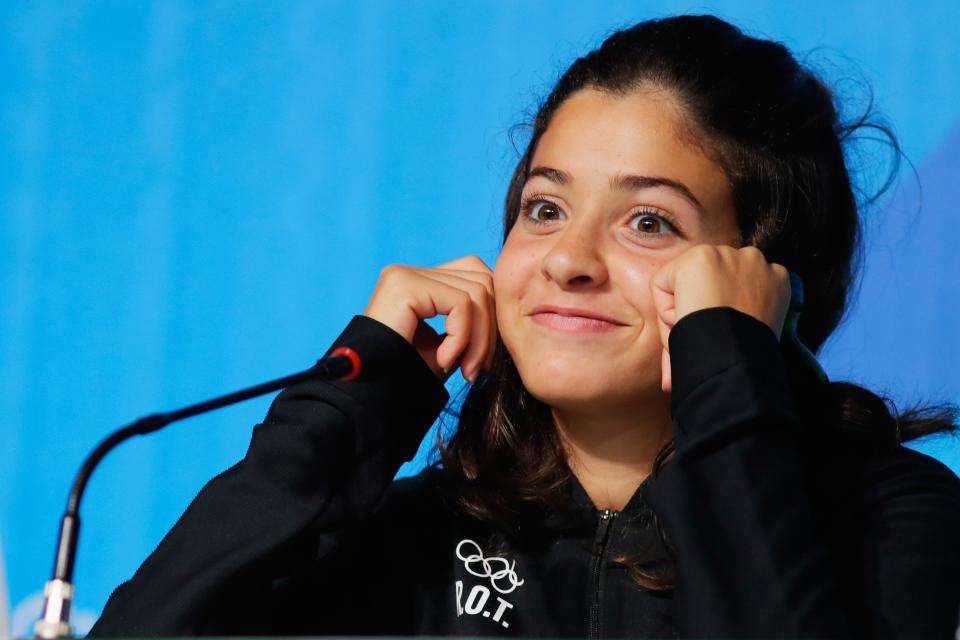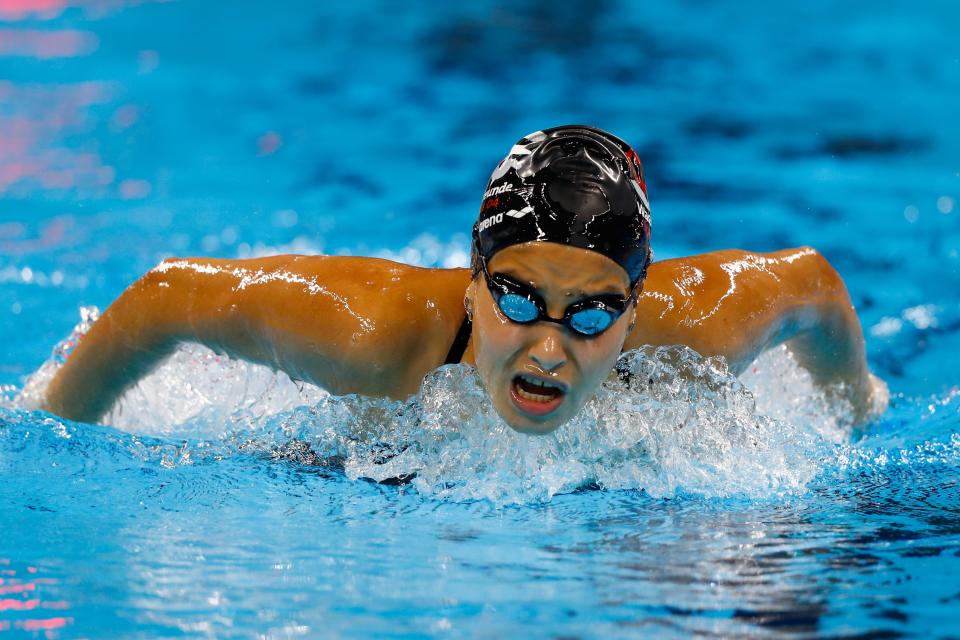How a Syrian refugee became an Olympic hero before the Rio Games even started
RIO DE JANEIRO — The small boat, just a dinghy, was designed to hold six people. On this night, there were 20 – all refugees – all trying to crowd in and slip out of the woods near Izmir, Turkey, out into the Aegean Sea and, a few hours later, land ashore a on the Greek island of Lesbos and the promised land of Europe.
Many, including a then-17-year-old girl named Yusra Mardini, had fled all the way from war-torn Syria. She, along with her sister, left behind her parents and made it from Damascus to Beirut to Istanbul to here, overloading this little boat with a single small outdoor motor – a motor that would die 20 minutes into the trip.
By then the boat began to sink, and Mardini, her sister and two men – the only ones capable of swimming – got out and began pushing and pulling the boat to Greece, doing anything to avoid becoming another group of refugees who drowned trying to get to the future, trying to get to Europe. Small children were aboard. So were terrified adults. For three and a half hours they swam, cold and exhausted, until the island emerged.
“I swam for my life when the boat I was in sank,” Mardini said here Tuesday. “Without swimming I don’t think I would have survived.”
On Friday, Mardini walked into the Opening Ceremony of the Rio Games as an Olympian. Her sport? Swimming, of course.
She isn’t just a swimmer. She is a survivor, part of a small band of heroes competing under the banner of the Refugee Team, a new designation from the IOC of displaced athletes who hail, in general, from South Sudan, the Democratic Republic of the Congo and Syria.
[Related: Los Angeles lifeguard will swim for Syria in Rio]
Now 18, Mardini, who eventually settled in Germany, has no illusions of winning a medal. That isn’t, and never was, the point. Swimming represents normality, a time to focus on going faster and farther, not on the bombings that destroyed her homeland, not on the frightful fleeing that led her to Berlin, not the loneliness of friends and family left behind, some lost forever. In the pool she is an athlete, not a refugee. Here in Rio she will compete in the 100-meter freestyle and the 100-meter butterfly.
“My sport was there when everyone let me down,” she said. “Whenever I had a lot of problems, I’d run away to the swimming and do my best in the water. I would jump into the water and leave all of my problems behind my back by swimming harder.”
This is the world’s team. This is a reminder that for all the fear and political vitriol thrown at refugees, that there are real people, with real dreams and real talent to achieve them. This group is a reminder that human strength can overwhelm even the most desperate of moments, like tugging a boat through choppy waters. Lining up at a swim meet is no big deal after that.
“We are really happy together,” Mardini said of the Refugee Team. “All the team has a great friendship. We don’t speak the same language, we aren’t from the same countries, but the Olympic flag brought all of us together. Now we are representing refugees around the world. We want to show we can do everything we can for being good athletes and good people. We are trying to give the best we can.”
This is a new initiative for the IOC and an important one. The Olympics can be overrun with nationalism – not always a bad thing, but worth guarding against. This is a reminder to the expected billion or so people around the world who tune into the Opening Ceremony that there are millions among us who wish they could have a country. These are the faces behind the news footage of blasted-out buildings and tanks moving down dusty roads.
“It was the normal bombings [and] shootings,” Mardini said of life in Damascus during a civil war that began in 2011. “We decide to leave because there wasn’t a normal life. You know there is no future for what you are doing. You are doing a normal life, you are going to school, going to swimming, going to training, but you know there is no point anymore. You are doing it because you love it or it’s your passion but you aren’t going to arrive to the world level or the Olympic level, so that is why we left.”
It’s such a dire situation that families willingly split, that parents (Mardini’s mother is now with them in Germany) send off teen girls to attempt harrowing runs to potential safety, even as other nations try to push them back.
Mardini said she misses her old life. Misses her old house – it was destroyed by a bomb. Misses her old neighborhood and friends. She wants to go back to Syria one day, but now it is impossible. So she hopes the vision of her and her fellow refugees reaches televisions in Damascus, televisions everywhere. She isn’t bitter. She is thankful for the chance, thankful for the voice that the Olympics have given her, given all of her new teammates.
“A lot of things happened to our lives and it was really bad, but when you remember that life will not stop for you, your pain or your problems, at some point you have to move on,” Mardini said. “There is a lot of problems in our countries, but every time we remember the good things in it and remember the memories and everything, we motivate ourselves because there are a lot of people learning a lot from us.
“There are a lot of people writing us and telling us their stories and a lot of people have hopes on us and we can’t let them down,” she continued. “Everyday those fans are motivating us.”
[Related: Why Refugee Olympic Team is heart and soul of Rio Games]
From outside that little boat and pulling people to safety, to Rio, a swim for fun and joy and competition.
“I want everyone to think that refugees are normal humans who had homelands and lost them,” she said. “Not because they wanted to and not because they wanted to leave. They have to leave their countries and everyone is trying to get a new life, to get a better life. Here we are entering the stadium, encouraging everyone to do their dreams.”
The Olympics haven’t even started, yet its first heroes are undeniable.
More Olympics coverage from Yahoo Sports:



